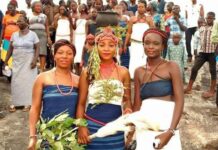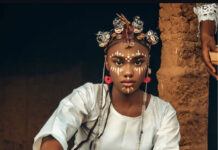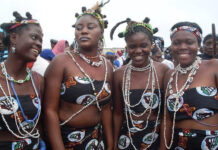From the reactions that followed the funeral rites of the Aku Uka of Wukari, it will be safe to conclude that many are not conversant with Jukun customs and traditions.
This is curious because Jukun happens to be one of the most mentioned and historically recorded ethnic nations in Nigeria.
Why a fundamental aspect of their culture that has to do with the funeral rites of their king came as a surprise to others recently needs to be looked into.
READ ALSO: Chadian presidential elections and Nigeria’s security, by Andrew Agbese
Many for instance are familiar with the burial rites of kings of major ethnic groups in Nigeria.
Recently, when there were reports about a likely sacrifice of a king’s horseman in Yorubaland, the reaction was not that of shock but centered mainly around the continuation of such practices in modern times.
The awareness and projection of People’s culture have been made possible not just through historical records or folk tales but through deliberate literary and other works of arts that make it memorable and appealing.
It just unfolded that the Jukuns may have been sitting on a curious theme in literature.
The rites of passage observed for their kings is curious enough to weave a plot around to explain the historical background and challenges.
Literary works like Things Fall Apart, Arrow of God etc by Chinua Achebe for instance, serve these roles when they offer more than a glimpse of the Igbo culture while works like Death And The Kings Horseman, The Strong Breed etc by Nobel Laureate, Professor Wole Soyinka do same by giving insights into Yoruba Culture.
Works like Shaihu Umar by Abubakar Tafawa Balewa, Jiki Magayi by John Tafida Umaru Zaria and Magana Jari Ce by Abubakar Imam also educate about premodern Hausa settings.
But many other ethnic groups are yet to showcase their rich culture beyond historical mention of war conquests. They do not bother going the extra mile to elucidate on perceptions about certain practices others find curious about them.
Scholars like Joshua Sinclair and Djibir Tamsir Niane who transformed the legends of Shaka Zulu and that of Sundiata respectively into literary masterpieces must have had this in mind.
Others like Prof. Iyorwurse Hagher and Prof. Samsudeen Amali have developed the outcome of their researches on the history and culture of their people into literary works that appeal to mass understanding of oral history and traditions.
In the play, Journey To Swem Karagbe, for instance, Prof. Hagher did more than present the basic issues in leadership but offered a background to the tradition surrounding kingship in precolonial Tiv settings.
Similarly, one of the reliable depiction of the Idoma ancestry has been Prof. Amali’s, Onugbo mlÓko.
It is however perplexing that with such a strong culture that has survived till date, the Jukuns have not made the transition of their kings a theme in modern literature despite the mystery it evinces and the debate it engenders.
Though there seem to be an overwhelming euphoria surrounding the preservation of the culture, there are bound to be disagreements with some of the aspects, especially the one that allows the living to accompany the dead.
Such inquisitiveness, reflections and debates regarded sometimes as iconoclastic, most times deepen knowledge about such cultures by capturing the views of those versed in such cultural practices and provide the bulwark of defense against total condemnation.
Voodoo practices in Haiti and other settlements at a time ignited a flurry of researches, art and literary interest when a certain man, who was pronounced dead at a recognised hospital and whose burial was attended by many, was discovered to have walked out of his grave and after many weeks of working at a plantation far away from his town as a zombie, found his way home.
The mystery behind his ‘resurrection’ and return led to many discoveries that explained the plausibility in the zombification of the dead.
Not surprising, the rites of passage of the Aku Uka has elicited interest.
In certain cultures in Nigeria, even ordinary mortals, if they die in places far from their homes, are brought back to life and made to walk the distance back to the village before their spirits are permitted to leave the bodies for internment.
In many Nigerian societies, kings are not buried. What remains of their bodies is usually known to only a few, the idea being that as representatives of some spirit beings, their transition take different forms from that of ordinary mortals.
Oral account of one of the revered founders of an ethnic group in Northeast Nigeria, has it that he sank into the earth while sitting on his throne and his body has never been recovered.
In another culture in North-central Nigeria, a newly installed king is not allowed into the palace of his predecessor for some years as he is likely to see the dead king sitting and staring at him if he as much as goes near the palace.
But such mysteries are lost and have been waved aside as superstitions due to fear of being labelled irreligious or fetish.
It was when Helon Habila wrote in one of his novels about a certain snake that visits houses with new born babies in his native Tangle that people got to know it was not mere fiction.
It was when Chinua Achebe wrote that one of Ezeulu’s son locked up a python in his box that many knew that it is a taboo to kill python in certain parts of Igboland.
There’s a lot the present and future generations need to know and understand about their culture before it confronts them in real life.
The transition of the Aku Uka and the accompanying shock should serve as an eye opener.
Mr Agbese is an Abuja based journalist
Follow the Neptune Prime channel on WhatsApp:
Do you have breaking news, interview request, opinion, suggestion, or want your event covered? Email us at neptuneprime2233@gmail.com





